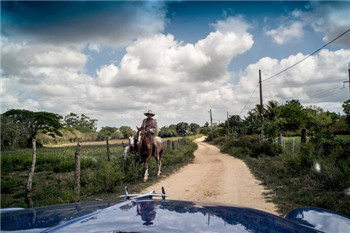(单词翻译:单击)

Such lyricism inspired the Padilla 1968 Golden Bear cigar, an earthy-flavored tribute to the poet. It’s called the 1968 Series because that’s the year Mr. Padilla published the anthology “Fuera del Juego” (“Out of the Game”), which ultimately got him locked up for “having plotted against the powers of the state.” Cigar novices might mistake this hard-to-find cigar band’s red and gold illustration for a crown, but aficionados know it’s actually the nib of the poet’s fountain pen.
这首诗促成了“帕迪亚1968年金熊”(Padilla 1968 Golden Bear)雪茄的诞生,以其朴实的香味向这位诗人致敬。之所以被命名为“1968系列”(1968 Series),是因为帕迪亚在这一年出版了诗集《游戏之外》(Fuera del Juego)(英译“Out of the Game”),而这本诗集最终成了他因“阴谋反对国家政权”被捕的导火索。雪茄新手可能会以为这少见的红金相间的标箍图案是一个王冠,但懂行的人就知道,这其实是帕迪亚所用钢笔的笔尖。
Cigar nostalgia abounds in Cuba, and I encountered few more eager to share it than Michael Phillips, a Briton who moved to Havana some 25 years ago to teach English. He is a devoted member of the city’s Cigar Aficionado Club, whose members — foreign diplomats and businessmen — meet monthly for dinner, cigars and conversation. Sitting in the spacious living room of his apartment in the upscale Miramar neighborhood, where most of the city’s top government officials reside, Mr. Phillips poured Cognac and held out a tray of unbanded cigars, from short coronas to lengthier Churchills, tan Habanos to darker Maduros. He grinned at my selection, pyramid-shaped and walnut in color.
雪茄怀旧情绪也弥漫着整个古巴。我没见过比迈克尔·菲利普斯(Michael Phillips)更渴望分享这种情绪的人了,这位英国人在大约25年前移居到哈瓦那,教授英语。他是哈瓦那《雪茄爱好者》杂志读者会(Cigar Aficionado Club)的忠实会员。这些会员多是外交官和商人,他们每月聚会一次,一起吃晚餐、抽雪茄、聊天。菲利普斯的公寓位于高档的米拉马尔区(Miramar),大部分古巴政要也住在那里。菲利普斯先生坐在宽敞的起居室,倒了一杯干邑白兰地,拿出一碟不带标箍的雪茄,里面有短皇冠(short corona),也有长一些的丘吉尔(Churchill),有黄褐色的哈伯纳斯,也有深褐色的马杜罗(Maduro)。我选了一支金字塔形状的栗色雪茄,对于我的选择,他乐了起来。
“Don’t ask me where it came from,” he said mischievously, “because I cannot tell you.”
“别问我这是从哪儿来的,”他调皮地说,“因为我不能告诉你。”
After some prodding, Mr. Phillips explained his suspiciously bandless cigar menu: “The rollers in the factory have a quota, but many of the women find a way to sneak a few extras out. So they roll for eight hours in the factory, and then come home and roll for another two hours.”
几番软磨硬泡之下,菲利普斯先生终于透露了他这些可疑的无烟标雪茄的来历:“卷烟厂工人的配额是固定的,但很多女工都有办法偷拿一些出来。所以她们每天在工厂里卷八小时,下班回家再卷两小时。”
He lit up, drew from his cigar, and watched the plume rise. “There was one girl who worked at the Romeo y Julieta factory; she was pregnant for three years!” He chuckled at such clever smuggling. “But yes, these are as good as the ones from the factory.”
他点上雪茄,吸了一口,望着升起的烟雾。“有个女孩在罗密欧与朱丽叶(Romeo y Julieta)工厂工作;她都怀孕三年了!”他对这绝妙的走私招数暗自窃喜。“但是当然了,这些雪茄和工厂里的一样好。”
Cigar enthusiasts are a discriminating bunch, yet most agree that Cuba is blessed with a unique combination of sun, soil and moisture — coupled with a rich history of hand-rolling — that makes for the world’s most flavorful cigars, Mr. Phillips said. If there was a dark period, it occurred during the Communist revolution as some of Cuba’s most talented growers fled and set up operations in countries such as the Dominican Republic, Ecuador, Honduras and Nicaragua. While an infusion of Soviet cash helped to prop up Cuba’s cigar industry, competition over the next several decades from its new foreign rivals — along with some bad crop years and a dismal foray into tobacco hybridization — diminished its product. The complaints, ranging from poor flavor to shoddy construction, dragged Cuban cigars down in Cigar Aficionado magazine’s vaunted annual rankings. From 1998 to 2005, Cuban cigars never scored above an average 88 on a 100-point scale, compared with its typical 90-plus average in years beforehand.
雪茄爱好者是一群挑剔鬼,但大多数人都会同意这个说法:古巴有着得天独厚的阳光、土壤及湿度——再加上手卷烟的悠久历史,造就了世界上最可口的雪茄,菲利普斯先生说道。唯有一段黑暗的时期,是在共产主义革命期间,最好的烟草种植者都逃离了古巴,把生意搬到了多米尼加共和国、厄瓜多尔、洪都拉斯和尼加拉瓜等地。虽然苏联的资金支持了古巴雪茄行业的发展,但是之后的几十年里,新的外国竞争者出现,再加上一些年份收成不好、烟草杂交成果惨淡,古巴雪茄的质量由此下降,被频频投诉味道差、做工低劣,在《雪茄爱好者》杂志上一度风光的年度排名也开始下滑。1998年到2005年,古巴雪茄的平均得分没有一年超过88分(满分100分),而在此之前一直是90多分。
Such history is always surfacing here, a collision of old glory and modern reality that infuses even its architecture. On Tenerife Street in central Havana, for instance, is a former factory that was once a major production house and storage facility for cigars. Decades ago, the owners fled and passed the building down to remaining family members. A few years ago, though, city officials took note that there was, once again, a family living in the factory, and have since taken over the rest of it and renovated it with apartments. Former factory workers, who once lived in poor conditions, now reside free of charge in modern living quarters.
这段历史一直呈现在明处,而这一旧时辉煌与当代现实的碰撞甚至也融入了古巴的建筑中。比如,在哈瓦那中心地带的特纳里夫大街(Tenerife Street)有一栋房子,前身是一间工厂,作为雪茄的主要生产和存储的地点。几十年前,老板逃离了这里,把这栋建筑留给了家人。但是几年前,哈瓦那的市政府官员发现又有一个家庭住在这间工厂里,于是就接管了工厂的其余部分,并把它改造成了公寓楼。如今,那些曾经居住条件恶劣的前工厂工人们可以免费住在现代化住宅里了。
In Cuba, those smoking the finest cigars tend to be visitors like me, expats like Mr. Phillips, senior government officials and international business people. Most Cubans living on a state salary of less than $20 a month can’t afford hand-rolled cigars of export quality. Cubans do smoke local cigars, but they are not good quality and cost about a nickel in American currency and can be fodder for swindling undiscerning tourists.
在古巴,能抽最好的雪茄的人一般都是像我这样的游客、菲利普斯先生这样的侨民、政府高官,或是国际商务人士。大多数靠着每月不到20美元的国家工资的古巴人买不起出口品质的手卷雪茄。古巴人抽本地雪茄,但本地雪茄的质量不好,价格约合5美分一支,还可以拿来骗不识货的游客。


